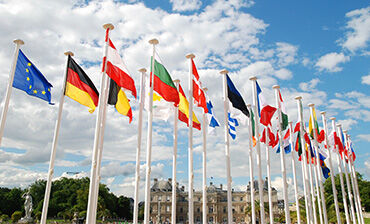ECDC begins epidemic monitoring of the EURO 2020/2021 Football Championship

Between 11 June and 11 July 2021, a total of 51 games will be held, with COVID-19 restrictions in place, in 11 host countries, seven of which are EU Member States: Denmark, Germany, Hungary, Italy, the Netherlands, Romania, and Spain. The remaining four countries are Azerbaijan, England, Russia and Scotland. An estimated 460 000 spectators will attend the games and, in some cases, they will have to provide proof of a negative COVID-19 test, and/or vaccination, and/or previous COVID-19 infection to gain access to stadiums.
On 4 June 2021, ECDC began a number of enhanced epidemic intelligence activities and will continue until 16 July 2021 (including one week before and after the event). Reports will be provided in the weekly Communicable Disease Threats Report (CDTR).
On the eve of EURO 2020, ECDC Director Andrea Ammon said:
‘As I am sure that many fans in Europe are looking forward to EURO 2020 and watching their national teams in stadiums across the continent, it is important to remember that the pandemic is not over. We must remain vigilant in the face of any rise in infections. ECDC will play its part through increased epidemic intelligence activities before, during and after the tournament in an effort to keep everyone safe.’
Information for participants and travellers
Before travelling, fans are strongly advised to check the latest COVID-19 restrictions on the official websites of the hosting country and, more specifically, for the stadium in question. The European Commission’s Re-open EU portal is a useful resource for keeping up-to-date with COVID-19 guidelines across the region.
In addition to COVID-19 requirements and recommendations, general health recommendations should apply to all, including being up-to-date with the necessary vaccinations in accordance with national schedules. Travellers should also practise good hygiene to avoid food- and waterborne diseases and minimise the risk of respiratory diseases by washing hands often with soap and water, using hand sanitisers, practising cough etiquette, and wearing a mask. They should also avoid direct contact with anyone showing symptoms of fever and/or respiratory illness (e.g. coughing, sneezing etc.)
In the event of fever or any other symptoms, travellers should consult a healthcare provider to enable early diagnosis and treatment. Infected individuals must refrain from participating in any activity involving direct contact with others. If a healthcare provider is consulted after returning from a trip, they should be informed that the patient travelled to a UEFA hosting country.

